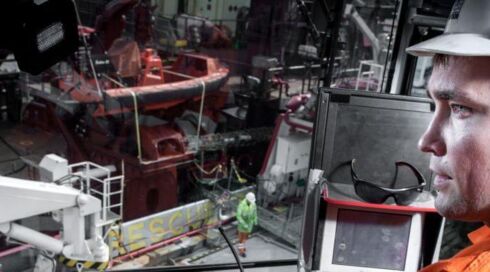6
Aleksei Mitrokhin
A mighty machine
In the late summer of 2005, Aleksei Mitrokhin started the naval architecture study at the State Marine Technical University in Saint Petersburg, Russia. To help pay the tuition he started working in a harbour not far from the university. Two years after Aleksei started university, he no longer wanted to assist the crane operators; he wanted to become an actual operator himself. Still wanting to make his family proud, he continued to attend classes at university, but now in combination with studying for his first crane operator exam. “Ever since I had first seen the big machines, I always wanted to climb up top and operate them. The thrill of looking out over everything below and the excitement of controlling a machine this powerful—well, I think it’s just something you have to experience to fully understand.”
Technological adventure
Although Aleksei sometimes thinks about his university degree and the potential career opportunities that come with it, he still enjoys being on the crane every day. Technological developments play a significant role: “Recently I was on a crane with special TTS compensation, which ensures that the hook attached to the crane maintains its exact position, even with the most extreme currents. It’s very unlikely that my work will ever get boring because of technical feats like these inherent in the offshore industry.”
Bigger and better
Not long after Aleksei started to work as an offshore crane operator, he got the opportunity to go from operating deck and level luffing cranes to work as a main and ROV crane operator on diving support vessels (DSV). “Being a crane operator on a diving support vessel is completely different from operating cranes on any other vessel. On a DSV, the crane operator needs to bridge the gap between the divers and the vessel. To me, that’s much more challenging, especially because it requires a great deal of responsibility and technical skills. Imagine the consequences for a billion-dollar project when video cameras fail for almost two hours while divers are hundreds of meters below the surface. In these kinds of situations, stress levels hit the ceiling and you, as a crane operator, have the important task to keep the cage in place and provide the divers with the right tools at the right moment. In those conditions you really need to feel the crane, because losing control, even for the shortest moment, can have immense consequences for the divers and the entire operation.”
A talent
The offshore industry has always been in development and Aleksei has witnessed all sorts of advances for over a decade now. “In this industry even the most experienced lack experience. On-going technological advances require you as a professional to keep developing yourself.” While he is always on the lookout for self-development opportunities, he also takes pleasure in helping newcomers to progress in their careers. Years ago, Aleksei had always believed that hard work was the only thing necessary to become a crane operator. Now he holds a different view and believes that becoming a competent crane operator takes a bit more. “It’s common that new operators can’t cope with difficult situations because they don’t know how to anticipate the risks that could potentially harm operations. Although nowadays most cranes are equipped with cutting-edge technology that foresees and detects most threats, dangerous situations could arise if one blindly relies on what the systems say. It is of vital importance that crane operators sense when something’s wrong. Of course, this feeling grows with time. It’s hard to explain what you should exactly feel when operating a crane; it is not something that you can easily teach someone. Anyone can learn how to operate the controls, but knowing when and how to respond correctly in a variety of situations mainly comes down to common sense and responsiveness. I’ve seen many people get confused; they miss the feeling and end up moving things they shouldn’t. This job can get very stressful and therefore a crane operator has to be fit, physically and mentally.”
.png)
.png)
